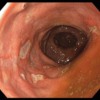Hello / had colectomy 11 years ago and have had J pouch since / for first 2-3 years no problems whatsoever / then had what Dr and I figures was pouchitis (more frequent stools and lost weight but no blood or cramps) flagyl did not work but cipro knocked it out / in the last 5 years or so I will get the symptoms of more frequent stools (10-15 daily vs 5-7) but no lost weight, blood or significant cramping - cipro always "cures" me but symptoms slowly return and I end up using cipro about every 3-4 months - last scope in March showed well w/ no pouchitis but I had just come off using cipro - symptoms have slowly returned and again cipro knocked the symptoms out but this time the frequent stools have returned more quickly (about 2 weeks after finishing cipro) / I am assuming I have built up some tolerance to cipro and would prefer not to take it because it is my understanding I can build up such a tolerance that it may not work someday in the event I could need it for some other malady / although by symptoms of apparent pouchitis are not nearly as severe as others I have read about and my Dr said he can put me a cipro maintenance dose, thought I might try a probiotic / VSL#3 has been suggested / just turned 62 and seem to be in pretty fair health (walk 15-20 miles weekly)
Original Post



